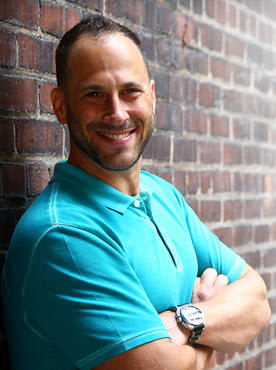
Zak Levitt Is a Two-time Emmy, Peabody, Clio, and NAACP Image Award-winning Filmmaker and Commercial Director Who Has Helmed Some of the Most Popular and Acclaimed Sports Documentaries of the Last Several Years. He Is Currently the Executive Vice President of Production for C13Originals, Producer of the Podcast Gangster Capitalism.
1) Gangster Capitalism, a podcast you write, direct, and executive produce for Cadence 13, just came out with its second season. It focuses on a fascinating story about the NRA. Talk about the essence of the story and how it crossed your radar?
Gangster Capitalism is at its best when it's able to tap into what makes a story polarizing. Certainly, we know that the NRA is polarizing, but once this incredibly private organization began to show some cracks during its annual convention in April of 2019, it became apparent that there was a lot more going on behind the scenes than outsiders knew. What made this story so relevant to us was that this story wasn't about guns. It's about money. Listen to the podcast here.
2) (Follow up question to Question 1) How difficult was it to track down sources who could knowledgeably speak about a story so few were aware of?
Finding people, other than journalists, who would go on the record was a big concern going into pre-production. But what we found is that there's an enormous community of NRA members who are fed up with leadership. They are strong second amendment advocates, but they are so displeased with the way the NRA has put itself into its current situation, and they want change. Some were former employees and people who donate large sums of money to the NRA, only to see that money being used for things like fancy suits and private jet travel. They were more than happy to speak.
3) Season 1 of Gangster Capitalism focused on the College Admissions scandal that dominated the 2019 news cycle. The podcast was fantastic, covering multiple angles of a wide-ranging story. Talk about the difference between finding and telling a unique story on a subject literally everyone knows (the admissions scandal) vs essentially breaking a story (the NRA story).
Although the NRA story may have been a little more under the radar, certainly compared to Operation Varsity Blues, I can't say we broke the NRA story. It had been written about by amazing journalists such as Mike Spies, Danny Hakim, Mark Maremont, and so many others. But the commonality with both seasons is that we knew we could bring much more contextualization and nuance to a story that is only given so much room in a news article. The NRA story is actually one that's repeated itself over the decades, in different ways, and we knew that we'd be able to bring all of the beats of the story together into a unique narrative that hasn't been told. And we knew it would be something visceral.
4) Prior to getting into creating podcasts, you made incredible documentary films including the 30 for 30s "Bad Boys," "The Doctor," "The Dream Team," and "Once Brothers." What led you to the podcast medium and what challenges and opportunities does the medium present compared to film?
I'd love to be able to say that I had some prescient awareness that podcasts would become as big as they have. Truthfully, I never could've predicted the growth they've had, just in the two years I've been making them. Aside from the incredibly large audiences that they can generate, the main thing that brought me into this space was the opportunity to be able to tell unique stories across all genres, and some that don't even seem to fit into any particular genre. Last year, I made a podcast called Root of Evil. I still have trouble describing that story. It's really hard to see Root of Evil as a film, but as a podcast, it worked.
5) As a podcast do you feel more like a producer/director or a journalist? How blurred are those lines?
The stories we do at C13 Originals require a tremendous amount of research. Once the initial research is done, we need to find the people to speak to the story, develop trust so they feel comfortable telling their story, and then tell it in the most entertaining and informative way. So, essentially, at some point, all of us on the team feel like directors, writers, producers, researchers, journalists, and certainly editors.
6) What impact does the pandemic have on the way you do your job. And, assuming you're spending more time at home, what silver linings have you observed during this forced Stay at Home period?
It's hard to think of anything, or anybody, that the pandemic hasn't affected. But when you think about those who've lost loved ones, or our incredible health care workers and hospital staff who are just simply, heroes, it's easier to put things into perspective. We are creating content that we hope people engage with, and (maybe) helps to take their minds off of the ugliness out there for a bit. People are still listening to their podcasts, so we want to keep giving them something to listen to.
As far as a silver lining, the family time has really been special. My wife is no longer commuting, and we're sharing an office. Hearing your spouse in work mode is a totally new experience. Also, as disappointing as it is, sports were, of course, canceled for the kids. But instead of always feeling rushed to get them to a practice or game, now, we come downstairs and all hang together. Things have slowed down, and if there's any silver lining for me, that's the big one.
Listen to Gangster Capitalism here.

